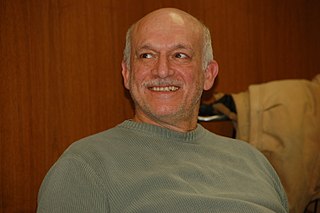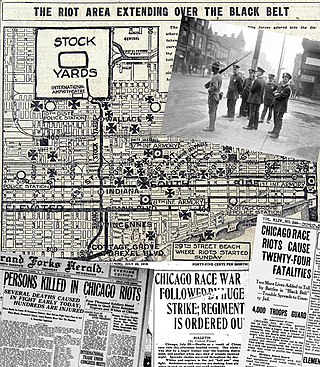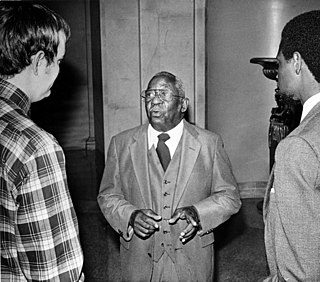Related Research Articles
In the broader context of racism in the United States, mass racial violence in the United States consists of ethnic conflicts and race riots, along with such events as:

Michael Klonsky is an American educator, author, and political activist. He is known for his work with the Students for a Democratic Society, the New Communist Movement, and, later, the small schools movement.

Roland Gerhard Fryer Jr. is an American economist and professor at Harvard University. Following a difficult childhood, Fryer earned an athletic scholarship to the University of Texas at Arlington, but once there chose to concentrate instead on academics. Graduating cum laude in 2+1⁄2 years, he went on to receive a Ph.D. in economics from Pennsylvania State University in 2002 and completed postdoctoral work at the University of Chicago with Gary Becker. He joined the faculty of Harvard University and rapidly rose through the academic ranks; in 2007, at age 30, he became the second-youngest professor, and the youngest African American, ever to be awarded tenure at Harvard. He has received numerous awards, including a MacArthur Fellowship in 2011 and the John Bates Clark Medal in 2015.
In the United States, the relationship between race and crime has been a topic of public controversy and scholarly debate for more than a century. Crime rates vary significantly between racial groups, however, academic research indicates that the over-representation of some racial minorities in the criminal justice system can in part be explained by socioeconomic factors, such as poverty, exposure to poor neighborhoods, poor access to public and early education, and exposure to harmful chemicals and pollution. Racial housing segregation has also been linked to racial disparities in crime rates, as blacks have historically and to the present been prevented from moving into prosperous low-crime areas through actions of the government and private actors. Various explanations within criminology have been proposed for racial disparities in crime rates, including conflict theory, strain theory, general strain theory, social disorganization theory, macrostructural opportunity theory, social control theory, and subcultural theory.
Christopher Winship is Diker-Tishman Professor of sociology at Harvard University, and principal of the Hauser Center for Nonprofit Organizations at Harvard. He is best known for his contributions to quantitative methods in sociology and, since 1995, has served as editor of Sociological Methods and Research. He received the 2006 Paul Lazarsfeld Award from the Methodology Section of the American Sociological Association, which recognizes outstanding contributions over a career to sociological methodology.
The Division Street riots were episodes of rioting and civil unrest, which started on June 12 and continued through June 14, 1966. These riots are remembered as a turning point in Puerto Rican civic involvement in Chicago. This was the first riot in the United States attributed to Puerto Ricans.

The Chicago race riot of 1919 was a violent racial conflict between white Americans and black Americans that began on the South Side of Chicago, Illinois, on July 27 and ended on August 3, 1919. During the riot, 38 people died. Over the week, injuries attributed to the episodic confrontations stood at 537, two-thirds black and one-third white; and between 1,000 and 2,000 residents, most of them black, lost their homes. Due to its sustained violence and widespread economic impact, it is considered the worst of the scores of riots and civil disturbances across the United States during the "Red Summer" of 1919, so named because of its racial and labor violence. It was also one of the worst riots in the history of Illinois.
Ernst Freund was a noted American legal scholar. He received a Dr. Jur. from the University of Heidelberg (1884) and a Ph.D. in political science from Columbia University (1897). He was professor of political science at the University of Chicago (1894–1902) and then professor of law at Chicago (1903–1932), serving as the John P. Wilson Professor of Law (1929–1932). Freund was principally responsible for the development of administrative law in the United States during the early twentieth century. He was one of the organizers of the Immigrants' Protective League (1908). The University of Chicago Law School has established the Ernst Freund Distinguished Service Professorship of Law and Ethics in his honor, a seat currently held by philosopher Martha Nussbaum. U.S. Supreme Court justice Felix Frankfurter described Freund as "one of the most distinguished of all legal scholars in the whole history of the legal professoriate".

Joe Richard Feagin is an American sociologist and social theorist who has conducted extensive research on racial and gender issues in the United States. He is currently the Ella C. McFadden Distinguished Professor at Texas A&M University. Feagin has previously taught at the University of Massachusetts, Boston, University of California, Riverside, University of Texas at Austin, and the University of Florida.
James R. Lewis was an American philosophy professor at Wuhan University. Lewis was an academic, scholar of religious studies, sociologist of religion, and writer, specializing in the academic study of new religious movements, astrology, and New Age.
The African American Policy Forum (AAPF) is a social justice think tank focused on issues of gender and diversity. AAPF seeks to build bridges between arts, activism, and the academy in order to address structural inequality and systemic oppression. AAPF develops and promotes frameworks and strategies that address a vision of racial justice that embraces the intersections of race, gender, class, and the array of barriers that disempower those who are marginalized in society.

Patrick Sharkey is an American urban sociologist and criminologist. He has been Professor of Sociology and Public Affairs at Princeton University since 2019. He was formerly Professor and Chair of the Department of Sociology at New York University, with an affiliation at NYU's Robert F. Wagner Graduate School of Public Service.
The Ferguson effect is an increase in violent crime rates in a community caused by reduced proactive policing due to the community's distrust and hostility towards police. The Ferguson effect was first proposed after police saw an increase in violence following the 2014 shooting of Michael Brown in Ferguson, Missouri. The term was coined by Doyle Sam Dotson III, the chief of the St. Louis police, to account for an increased murder rate in some U.S. cities following the Ferguson unrest. Whether the Ferguson effect really exists is subject of discussions with many published studies reporting contradicting findings concerning whether there is a change in crime rates, number of 911 calls, homicides, and proactive policing. Furthermore, the effect and influence of the portrayal of police brutality in the media is also contested.

Franklin E. Zimring is an American criminologist, law professor, and the William G. Simon Professor of Law at the UC Berkeley School of Law.
Victor M. Rios is a professor, author, and speaker. His research examines how inequality plays a determining role in the educational and life outcomes of marginalized populations. Rios is of Mexican American origin. He has written several books and is known for developing the theories of the youth control complex, Cultural Misframing, Legitimacy Policing, Masbloom, and Educator Projected Self-Actualization.
In the United States, use of deadly force by police has been a high-profile and contentious issue. In 2022, 1,096 people were killed by police shootings according to The Washington Post, while according to the "Mapping Police Violence" (MPV) project, 1,176 people were killed by police in total. MPV documented 1,213 killings by police for 2023.
Robert J. Jones is an American crop physiology scientist who is the tenth chancellor of the University of Illinois Urbana-Champaign. Jones is the first African-American to hold this office. He previously served as president of the University of Albany. In addition to his academic career, Jones was a tenor singer in Sounds of Blackness, a vocal ensemble from Minneapolis/St. Paul, Minnesota that sings gospel, soul, and R&B.

Virgil Darnell Hawkins was an African-American educator and Florida attorney who spent several decades of his life fighting for admission to practice law in Florida after having initially been denied admission to the University of Florida School of Law on the basis of his race.
Darnell Hunt is an American sociologist and academic administrator who has been serving as executive vice chancellor and provost of the University of California, Los Angeles since September 2022. At UCLA, he is a professor of sociology and African American studies and the former director of the Ralph J. Bunche Center for African American Studies.
Laurence Ralph is an American writer, filmmaker and researcher. He is a professor of anthropology at Princeton University and the Director of Center on Transnational Policing.
References
- ↑ "Darnell Felix Hawkins". Name Authority File.
- 1 2 "Darnell F. Hawkins". University of Mississippi Medical Center.[ permanent dead link ]
- ↑ Secter, Bob (16 June 1992). "Police Action Questioned in Chicago's Violence; 1,000 Arrested". Los Angeles Times.
- ↑ Texeira, Erin (15 August 1998). "'Driving While Black' bill targets police bias Data on traffic stops, searches stipulated in Senate legislation". Baltimore Sun. Archived from the original on 2017-11-21. Retrieved 2017-07-09.
- ↑ "Darnell Hawkins CV".